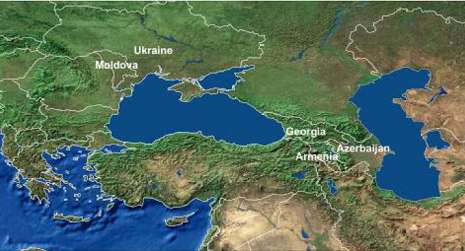Delicacy of Kosovo
Kosovo always was a delicate vector in the foreign policy of Russian Federation. It can be attributed to three main factors. Firstly, Serbia has historically good relations with Russia and deems it as a "big brother``, thereby protecting Serbia Russia tries to keep "younger brother’s” integrity and maintain its presence in the region as a big power. Secondly, Russia is afraid of secessionist movements inside of its own territory. Taking into consideration the federative structure of the state and fragile control over the North Caucasus states Russia is inconvenient about the precedent Kosovo could create. Third reason is probably the Western presence in the process of establishing new order in Balkans. At the same time the Kremlin assessed the secessionist incentives of the Kosovo Albanians as an ominous precedent to Muslim states inside its federation. On the other hand there was another concern that thereupon the West was elaborated on Kosovo, it might start afterwards to interfere to North Caucasus region. Igor Ivanovo, Russian Minister for Foreign Affairs, formerly told M. Albright: ‘Madeleine, don’t you understand, we have many Kosovo’s in Russia?`` (Brudenell, 2008). Russia oppose to the game which rules was formulated by Western states and wants its interests as a regional and global power to be taken into consideration. The incapability to prevent NATO from military engagement was deemed by Russian leadership and somehow by the society as a complete political default. Entirely it accelerated an explosion of popular discontent and there was a spiritual necessity for an ostensible motion to demonstrate to the society that Moscow did not concede global control to NATO. In nutshell recognition of South Ossetia and Abkhazia was a real time response given to NATO and EU.
Why Georgia not Azerbaijan?
After Saakashvili became a president of Georgia relation with this state was spoiled and ended up with the war in 2008. Foreign policy objectives imposed by Sakashvili, unlike policy conducted by Azerbaijan, were notable for its extreme pro-western orientation which automatically accompanied by anti-Russian foreign relations vector. One of the main objectives of Saakashvili administration was to apply for a NATO membership. The culmination of Russian-Georgian tension most probably was stimulated by the NATO summit held in Bucharest in April, 2008 where USA openly declared its support for Georgia’s membership and it was suggested new membership action plan.
NATO-Russia relations were already strained because of the intentions of the alliance to install missiles in Poland. This was considered by Russian leadership as a potential threat for their existence. Russian president Vladimir Putin several times warned western states thus expressed Russian objections towards the attitude of the alliance. Even he described this as a possibility restoration of new cold war-between NATO and Russia (Harding, 2007).Consequently for Russia NATO existence in its borders became a matter of existence and any elements with pro-NATO bias started to be interpreted by radical neo-realist Russian administration as a threat. In this context outermost Georgian-NATO rapprochement gradually assigned Georgia in the category of "needed to be punished``. According to military doctrine of Georgian Republic the main goal of Georgia is defined as joining the North Atlantic treaty Organization while in the military doctrine of Russian federation existence of external military forces near the borders of Russian Federation, as well as in post-soviet area is conceptualized as a threat. This contradiction stands in the core of Georgian-Russian collision and step by step contributed to recognition of Georgian enclaves (Svante E. Cornell, S. Frederick Starr, M.E. Sharpe, 2009).
Azerbaijan never dismissed the cooperation possibility with NATO, at the same time engaged in active political relations with Russia. Contrary to Georgia Azerbaijan had never hatched a plot or undertaken a risky venture which could ever provoke Russian government. Moreover, recognition of Georgian enclaves was an implicit message sent to Azerbaijan as well, indicating the potential consequences for the rest if they don’t obey Russia. Balanced foreign policy and precise political calculations of Azerbaijan Republic has prevented NK to be granted a recognition by Russia.
Internal factors
South Ossetia can also can be seen from the "internal window`` of Russian society. As opposed to Nagorno-Karabakh Ossetia has always been seemed as a part of Russian nation. State Duma of Russian Federation adopted new legislature in 2002 allowing the citizens of former soviet countries to be adopted as a member of Russian Federation with more lessened procedures (Жителям Южной Осетии перестали выдавать российские паспорта, 2009). Consequently many Ossetians get a chance to be a Russian citizen. In 2008 when Saakashvili ordered a command to attack South Ossetia many Russian citizens get injured and local citizens in Ossetia province were concerned about their own destiny. Recognition of South Ossetia and Abkhazia ensured the safety for this two enclaves. Russian leaders frequently highlight the number of civilians died in this attack and use it as a pretext for the principle "responsibility to protect``. The circumstances afford to make claimant about internal factors pushed the government to grant the recognition. In case of failure to protect South Ossetian and Russian citizens there was a risk that concerns in North Caucasian people will be turned to fear and create anarchic situation. NK doesn’t have any identity link with Russia, thereby being purely foreign policy issue for Putin’s administration.
Nihad Safarli
Works Cited
Brudenell, A. M. (2008). "Russia`s Role in the Kosovo Conflict of 1999”, . The RUSI Journal, 30-34.
Harding, L. (2007). Retrieved from https://azvision.az/redirect.php?url=http://www.theguardian.com/world/2007/apr/11/usa.topstories3.
Svante E. Cornell, S. Frederick Starr, M.E. Sharpe. (2009). The Guns of August 2008. In M. Sharpe.
Жителям Южной Осетии перестали выдавать российские паспорта. (2009). Retrieved from https://azvision.az/redirect.php?url=http://www.newsru.com/world/05mar2009/so_pasporta.html
More about:















































